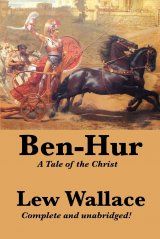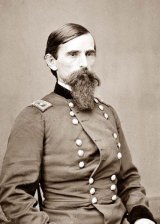Ben-Hur Page #5
Ben-Hur: A Tale of the Christ is a novel by Lew Wallace, published by Harper and Brothers on November 12, 1880, and considered "the most influential Christian book of the nineteenth century". It became a best-selling American novel, surpassing Harriet Beecher Stowe's Uncle Tom's Cabin in sales.
the Up-Angas, tell us of Virtue and Good Works, and of the Soul. So, if my brother will permit the saying"--the speaker bowed deferentially to the Greek--"ages before his people were known, the two great ideas, God and the Soul, had absorbed all the forces of the Hindoo mind. In further explanation let me say that Brahm is taught, by the same sacred books, as a Triad--Brahma, Vishnu, and Shiva. Of these, Brahma is said to have been the author of our race; which, in course of creation, he divided into four castes. First, he peopled the worlds below and the heavens above; next, he made the earth ready for terrestrial spirits; then from his mouth proceeded the Brahman caste, nearest in likeness to himself, highest and noblest, sole teachers of the Vedas, which at the same time flowed from his lips in finished state, perfect in all useful knowledge. From his arms next issued the Kshatriya, or warriors; from his breast, the seat of life, came the Vaisya, or producers--shepherds, farmers, merchants; from his foot, in sign of degradation, sprang the Sudra, or serviles, doomed to menial duties for the other classes--serfs, domestics, laborers, artisans. Take notice, further, that the law, so born with them, forbade a man of one caste becoming a member of another; the Brahman could not enter a lower order; if he violated the laws of his own grade, he became an outcast, lost to all but outcasts like himself." At this point, the imagination of the Greek, flashing forward upon all the consequences of such a degradation, overcame his eager attention, and he exclaimed, "In such a state, O brethren, what mighty need of a loving God!" "Yes," added the Egyptian, "of a loving God like ours." The brows of the Hindoo knit painfully; when the emotion was spent, he proceeded, in a softened voice. "I was born a Brahman. My life, consequently, was ordered down to its least act, its last hour. My first draught of nourishment; the giving me my compound name; taking me out the first time to see the sun; investing me with the triple thread by which I became one of the twice-born; my induction into the first order--were all celebrated with sacred texts and rigid ceremonies. I might not walk, eat, drink, or sleep without danger of violating a rule. And the penalty, O brethren, the penalty was to my soul! According to the degrees of omission, my soul went to one of the heavens--Indra's the lowest, Brahma's the highest; or it was driven back to become the life of a worm, a fly, a fish, or a brute. The reward for perfect observance was Beatitude, or absorption into the being of Brahm, which was not existence as much as absolute rest." The Hindoo gave himself a moment's thought; proceeding, he said: "The part of a Brahman's life called the first order is his student life. When I was ready to enter the second order--that is to say, when I was ready to marry and become a householder--I questioned everything, even Brahm; I was a heretic. From the depths of the well I had discovered a light above, and yearned to go up and see what all it shone upon. At last--ah, with what years of toil!--I stood in the perfect day, and beheld the principle of life, the element of religion, the link between the soul and God--Love!" The shrunken face of the good man kindled visibly, and he clasped his hands with force. A silence ensued, during which the others looked at him, the Greek through tears. At length he resumed: "The happiness of love is in action; its test is what one is willing to do for others. I could not rest. Brahm had filled the world with so much wretchedness. The Sudra appealed to me, so did the countless devotees and victims. The island of Ganga Lagor lies where the sacred waters of the Ganges disappear in the Indian Ocean. Thither I betook myself. In the shade of the temple built there to the sage Kapila, in a union of prayers with the disciples whom the sanctified memory of the holy man keeps around his house, I thought to find rest. But twice every year came pilgrimages of Hindoos seeking the purification of the waters. Their misery strengthened my love. Against its impulse to speak I clenched my jaws; for one word against Brahm or the Triad or the Shastras would doom me; one act of kindness to the outcast Brahmans who now and then dragged themselves to die on the burning sands--a blessing said, a cup of water given--and I became one of them, lost to family, country, privileges, caste. The love conquered! I spoke to the disciples in the temple; they drove me out. I spoke to the pilgrims; they stoned me from the island. On the highways I attempted to preach; my hearers fled from me, or sought my life. In all India, finally, there was not a place in which I could find peace or safety--not even among the outcasts, for, though fallen, they were still believers in Brahm. In my extremity, I looked for a solitude in which to hide from all but God. I followed the Ganges to its source, far up in the Himalayas. When I entered the pass at Hurdwar, where the river, in unstained purity, leaps to its course through the muddy lowlands, I prayed for my race, and thought myself lost to them forever. Through gorges, over cliffs, across glaciers, by peaks that seemed star-high, I made my way to the Lang Tso, a lake of marvellous beauty, asleep at the feet of the Tise Gangri, the Gurla, and the Kailas Parbot, giants which flaunt their crowns of snow everlastingly in the face of the sun. There, in the centre of the earth, where the Indus, Ganges, and Brahmapootra rise to run their different courses; where mankind took up their first abode, and separated to replete the world, leaving Balk, the mother of cities, to attest the great fact; where Nature, gone back to its primeval condition, and secure in its immensities, invites the sage and the exile, with promise of safety to the one and solitude to the other--there I went to abide alone with God, praying, fasting, waiting for death." Again the voice fell, and the bony hands met in a fervent clasp. "One night I walked by the shores of the lake, and spoke to the listening silence, 'When will God come and claim his own? Is there to be no redemption?' Suddenly a light began to glow tremulously out on the water; soon a star arose, and moved towards me, and stood overhead. The brightness stunned me. While I lay upon the ground, I heard a voice of infinite sweetness say, 'Thy love hath conquered. Blessed art thou, O son of India! The redemption is at hand. With two others, from far quarters of the earth, thou shalt see the Redeemer, and be a witness that he hath come. In the morning arise, and go meet them; and put all thy trust in the Spirit which shall guide thee.' "And from that time the light has stayed with me; so I knew it was the visible presence of the Spirit. In the morning I started to the world by the way I had come. In a cleft of the mountain I found a stone of vast worth, which I sold in Hurdwar. By Lahore, and Cabool, and Yezd, I came to Ispahan. There I bought the
Translation
Translate and read this book in other languages:
Select another language:
- - Select -
- 简体中文 (Chinese - Simplified)
- 繁體中文 (Chinese - Traditional)
- Español (Spanish)
- Esperanto (Esperanto)
- 日本語 (Japanese)
- Português (Portuguese)
- Deutsch (German)
- العربية (Arabic)
- Français (French)
- Русский (Russian)
- ಕನ್ನಡ (Kannada)
- 한국어 (Korean)
- עברית (Hebrew)
- Gaeilge (Irish)
- Українська (Ukrainian)
- اردو (Urdu)
- Magyar (Hungarian)
- मानक हिन्दी (Hindi)
- Indonesia (Indonesian)
- Italiano (Italian)
- தமிழ் (Tamil)
- Türkçe (Turkish)
- తెలుగు (Telugu)
- ภาษาไทย (Thai)
- Tiếng Việt (Vietnamese)
- Čeština (Czech)
- Polski (Polish)
- Bahasa Indonesia (Indonesian)
- Românește (Romanian)
- Nederlands (Dutch)
- Ελληνικά (Greek)
- Latinum (Latin)
- Svenska (Swedish)
- Dansk (Danish)
- Suomi (Finnish)
- فارسی (Persian)
- ייִדיש (Yiddish)
- հայերեն (Armenian)
- Norsk (Norwegian)
- English (English)
Citation
Use the citation below to add this book to your bibliography:
Style:MLAChicagoAPA
"Ben-Hur Books." Literature.com. STANDS4 LLC, 2025. Web. 5 Feb. 2025. <https://www.literature.com/book/ben-hur_1675>.








Discuss this Ben-Hur book with the community:
Report Comment
We're doing our best to make sure our content is useful, accurate and safe.
If by any chance you spot an inappropriate comment while navigating through our website please use this form to let us know, and we'll take care of it shortly.
Attachment
You need to be logged in to favorite.
Log In